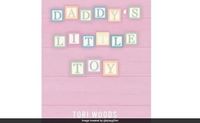In a controversial episode that has sparked outrage across social media, Lauren Tesolin-Mastrosa, a Sydney-based author known by her pen name Tori Woods, was arrested on March 21, 2025, on charges of producing child abuse material related to her erotic novel, Daddy’s Little Toy. The book revolves around the troubling relationship between an 18-year-old woman and her father’s friend, whose disturbing fixation reportedly began when she was just three years old.
This profound backlash against the book led New South Wales police to launch an investigation early in March 2025, following multiple complaints alleging that the novel contained graphic references to child sexual abuse. Critics have highlighted that the book’s cover—a design featuring the title rendered in children’s toy blocks—contributes to its controversial themes, as the narrative implies the father’s friend has been desiring the protagonist since her early childhood.
Tesolin-Mastrosa, aged 33, was taken into custody at her home in Quakers Hill, a suburb in western Sydney, following the execution of a search warrant that resulted in the seizure of several hard copies of the book for forensic examination. The charges leveled against her include possessing, disseminating, and producing child abuse material. Following her arrest, Tesolin-Mastrosa was granted conditional bail and is scheduled to appear in Blacktown Local Court on March 31.
Social media reacted explosively to the book, igniting global outrage. In her defense, Tesolin-Mastrosa claimed the controversy was a “big misunderstanding,” asserting her work was purely fictional and emphasizing that it did not promote or glorify child abuse or pedophilia. “What is being said is grossly disturbing and breaks my heart as well as makes me sick,” she stated.
In the aftermath of the backlash, her claims about the novel’s intent received skepticism as many readers and commentators commented on the book’s theme, explicitly referencing the male character’s obsession. The Daily Telegraph quoted a critic who remarked, “This author is a pedo enabler and shouldn't be allowed to have a platform,” reflecting the heightened emotions surrounding the narrative.
The book has since seen significant repercussions—removed from Amazon and Goodreads—to mitigate the fallout. Tesolin-Mastrosa's social media accounts were also deleted amid the intensified scrutiny, further isolating her in a swirling controversy. She did not shy away from acknowledging that some contents of her book might strike readers as inappropriate.
Georgia Stove, the cover designer for Daddy’s Little Toy, has distanced herself from the author, stating that she received numerous death threats in light of the backlash surrounding the book. “I have cut ties with Tori Woods, effective immediately,” she reported, noting that she had only perused the book's blurb, which she initially thought was acceptable due to its description of a “barely legal” theme.
Additionally, Tesolin-Mastrosa's employment as a marketing executive at BaptistCare, a Christian charity, has come under scrutiny as she was suspended following the complaints lodged against her. A spokesperson for the organization stated, “We can confirm that we received complaints regarding an unnamed employee late last week... BaptistCare takes matters of ethical conduct seriously.”
This incident underscores broader societal concerns about the representation and portrayal of sensitive issues within literature, particularly when it intersects with child protection and welfare. The content of Daddy’s Little Toy has triggered discussions regarding the boundaries of creative expression, with questions arising over an author's responsibility to handle such themes with sensitivity.
As the situation evolves, the legal ramifications for Tesolin-Mastrosa remain to be fully determined. The allegations against her have sparked significant debate about artistic freedom versus the ethical obligations of artists when addressing challenging subjects. Whether her claims of a misunderstanding hold water will likely unfold in the coming weeks as her case progresses through the judicial system.
In summary, the case of Lauren Tesolin-Mastrosa illustrates the complexities of navigating controversial subject matter in literary work, particularly in a digital age where public opinion can erupt instantly. As she prepares to appear in court, the discussion surrounding her work serves as a significant reminder of the power—and the peril—of words.








